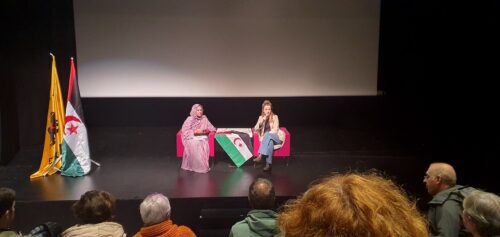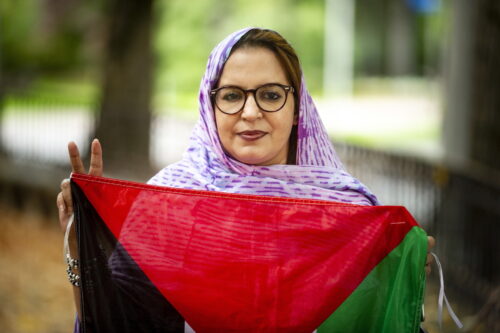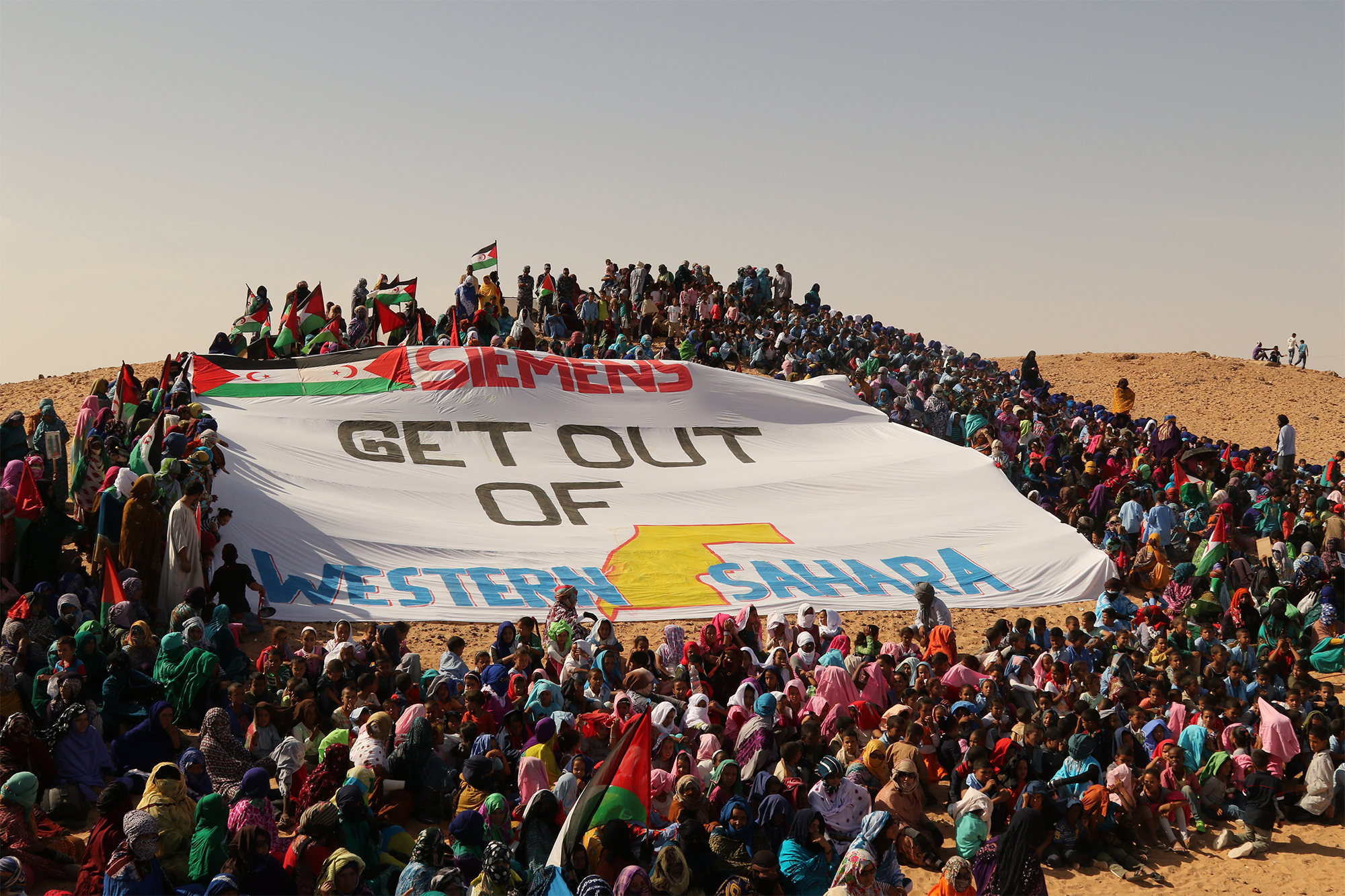"The Saharawi struggle cannot be separated from the feminist struggle"
- In the Western Sahara it talks about the struggle of women living in lands occupied by Morocco, focusing on the experiences of Sultana Khaya. Khaya suffers violence and video documenting.

He is Sahara Delegate in Bizkaia, Araba and Gipuzkoa. Born in Villa Cisneros (Western Sahara) on 4 February 1959, during Spanish colonialism (occupation lasted from 1884 until 1976), and asking for self-description, it begins as follows: ‘I have done a lot of activism for the Saharawi people’.
Journalist; professor of Castilian language in the Saharawi refugee camps (second official language in the Saharawi Republic); participant in the elaboration of the National Education Plan of the Sahara; member of the National Union of Saharawi Women and of the Spanish Delegation of the Polisario Front since 1986; graduate in Translation and Interpretation… At present, priority is given to the "rights and self-determination of the people".

On the 15th in Donibane, organized by the Bixi-Bixi Association, presented the documentary ‘Sultana Jaya 558 egun ilunpean’. What does the video show?
This is a documentary complaint by Sultana Khayaka. He is President of the League for the Defence of Human Rights in the Sahara Occupied Lands, but he is also a direct victim; victim of the violation of human rights in general and of the attacks on women in particular by the Moroccan regime and by the hand of its military and paramilitaries.
He collected images and evidence in the documentary for two years of the pandemic's life. It is located in the village of Bojador [occupied Western Sahara], in his house, where he lived under the guise of the virus.
These are very hard images in which one clearly sees harassment, restriction of freedom and mobility, everyday attacks… Red and harmful liquids were poured out at home, their furniture was destroyed, barriers were placed not to leave in windows and doors, water and light were cut off… You can also see a violation during the night, under the protection of darkness. The campaign conducted by the Sultan was presented under the name of Sultana Jaya 558 dark days.
The video aims to expose this constant violation of human rights as a condemnation of the aggressors. The documentary was presented by him in all the press talks, and we, activists, also have permission to demonstrate it, always for that purpose.
The documentary was recorded in the context of restrictions justified by the pandemic. But Morocco has perpetuated these cuts in the occupied territories.
Morocco, from the beginning of the occupation of Western Sahara, has come with the intention of burying the land. Like any occupying, aggressor and invading force, it is interested in its natural resources, so it exploits us illegally and without distinction. On the other hand, what it is doing is hurting the Saharawi people, and especially those who are actively claiming their rights, as is the case with Sultana Khaya.
So, they did test the pandemic, but it's not the first time. Many well-known, and also anonymous, women have suffered on their skin the violence that Morocco has in any voice raised against the occupation.
The pandemic remains unbeatable in order to further reduce, if possible, the rights and movements of the Sahrawi people. The peoples of the territories occupied by Morocco are open-air jails. It's the largest prison in the world.
"[Military] includes night rape under the protection of darkness"
Morocco imposes media silence, the land is completely closed for international journalists, monitors. In 2022 alone, Morocco expelled more than 170 agents, activists, politicians… and with total impunity from the occupied territories. There is no one who praises the Moroccan closure in the occupied territories.
The Sahrawi people are divided into three.
Indeed. The Sahrawi people are divided into three, while the Sahrawi territory is divided into two, one occupied by Morocco and another liberated and managed by the Polisario Front. In the latter, the Sahrawi people had already built schools, hospitals, administrative centers… and civilians living in agriculture or livestock. But when the second phase of the war broke out [3 November 2020], Morocco bombed all that liberated territory to force all its civilians to return to the refugee camps.
Right now, over 45,000 Sahrawis who once lived in liberated lands are in exile, and humanitarian aid did not plan, of course. Therefore, now the Polisario Front has to build new centers and outpatient clinics, which obtain housing and resources for all.
Thus, the citizens, the people, are divided into three: some live under the repression of Morocco. Another group, of more than 200,000 people, lives in the refugee camps, which unfortunately can only survive thanks to international aid, which is mostly managed by Saharawi women, as most men are on the front line. And finally, there is a minimal part that lives in the diaspora, mainly in Spain and France, because that population is out or needs medical treatment, because they are young people who are studying, or because they work outside to support their families.
However, the diaspora is also organized in groups that somehow try to spread the message of their people. They're mostly women.
Because they've been in that secret war for over two years.
These battles must be fought in addition to the military war, because we must see that veto imposed by Morocco and destroy the information blockade. Large media corporations are also accomplices, they are just companies and multinationals.
"The peoples of the territories occupied by Morocco are outdoor jails"
In short, they do not want to talk about the war in the Sahara, but they do want to talk about the war in Ukraine. Why? Because there's a total expoliation of natural resources, where there are a lot of companies involved in the Ibex-35, and they don't want you to know that there's a war in the Sahara, because they live because of the businesses of their resources. Because if there is a war in a territory, there can be no open appeal to companies to invest in that territory. That is why Morocco is investing a lot of money in the media, buying a lot of writers so that they do not talk about the Sahrawi war.
On the occasion of November 25 of this year, the Feminist Movement of the Basque Country will claim ‘feminist justice’. His words are: ‘Western Sahara is a question of justice and human rights’.
The Saharawi struggle is inseparable from the feminist struggle; the struggle of women is a component that further strengthens the popular struggle.
The Sahrawi women have always joined us and we will continue to denounce violence against all women throughout the world. Because in one land or another there is violence in different ways, but the aggressor is always the same; violence is the same.
In what violence is the bread of every day, you yourself said in the presentation: children keep the illusion.
And that's largely thanks to women. The struggle of the Saharawi people is also a struggle for identity. We, as a people, have huge differences with Morocco, and Morocco, by imposing its colonial presence, is trying to destroy them. It is only by seeing the differences between the Sahrawi people and Morocco that we will get arguments for our legitimate right to independence.
"64% of Moroccan women are illiterate and use them for the toughest jobs"
We women understand this work even better. Because in addition to fighting for our rights and freedoms, we strive to maintain and strengthen our identity. There are many prejudices in Western Europe, they believe that Saharawi women now have these rights because we are in a process of liberation and our men need us to help us on the path of freedom. But the reality is different. This comes from our culture, from our nomadic character, and that is precisely why we want to support it.
In the Saharawi people, women have a very prominent presence, which is detrimental to the countries around us, which have always dominated their women under a strict interpretation of Islam. Moroccan women are dominated. That is why 64% of them are illiterate and use them for the toughest jobs, without freedom.
He said that the Sahrawi women are, in their environment, the only ones really free.
In our uses and social codes women have always been free, they can get divorced as many times as they want, they always have the guardianship of their children. That is the pure Saharawi culture in which we have educated our generations. Therefore, the presence of older women in the struggle for liberation is greater than that of young women, either because many young people were born in exile or in the context of Moroccan domination. That is why we are also very concerned about exile, the longer it is prolonged and the occupation, the more the joint Saharawi culture will weaken.
In that I believe that the Saharawi culture has a great similarity with the Basque, because women have a fundamental role in this identity rooting.
Sultana Khaya's fight at home and abroad

Sultana Sidi Brahim Khaya (Bojador, Western Sahara, 1979) is an activist for the right to self-determination and independence in Western Sahara.
Speaking of him, and to explain who he is, the term that Jadiyetu El Moht has taken in his first words is ‘the Saharawi woman’. He is followed by President of the League for the Defence of Human Rights in occupied lands and President of the League against Illegal Expoliation of Natural Resources.
Since the age of 17, he has been fighting against Moroccan occupation. He and his mother and sister.
In 2019, when the second phase of the liberation war broke out, Morocco broke the truce in Spain under medical treatment and decided to return to its country of origin.
Back at the airport, it was discovered by the Moroccans. They made him a 'deep check-up', stripping him, claiming that he had no camera, so that he could not document the human rights violations in the occupied territories. From that point on, the Moroccan military was imprisoned at home. Two attempts at murder, according to the representative of the Basque Country, managed to survive. Even: “They tried to knock down their house using a giant truck.”
Thus, international organizations called for help and got some activists to enter their homes in the midst of a pandemic, where they stayed for more than three months to protect themselves.
Thanks to international pressure, Morocco was able to authorize the activist to leave the country and carry out a medical examination, which allowed Khaya to make an international complaint about the documentary.
The girl who appears in the center of photography, which can hardly be considered historical, is writing a list of adjectives: I, you, he, we, you, they. Looking down, I couldn't see what his gaze looked like.
Insensitive to the work of the photographer, you, slowly and... [+]
Leaving behind books, libraries and their benefits in April, Kabiak Sahrawi wishes to recall the dark side of his history, which is of greater importance in defending the identity and survival of peoples. We are talking about the destruction of the age-old and usual libraries... [+]
Sahara, herri bat erresistentzian liburua argitaratu du Kristina Berasainek. Urte luzez jarraitu du Mendebaldeko Saharako gatazka, 2005ean BERRIA egunkariko kazetari gisa lurralde okupatuetara lehen aldiz bidaia egin zuenetik.
The Spanish Foreign Minister denies that Spain is the administering power of the Western Sahara. But yes.
For years, Spain said that it was neutral on the Sahara issue, albeit a lie: it was very partial. For Morocco. The Palestinian National Power has a diplomatic mission in... [+]
Marokok 2020an ia hiru hamarkadatako su etena hautsi zuenetik, gerra berrabiarazi dute Rabatek eta Mendebaldeko Saharako askapen mugimendu nazionalak. Polisarioa XVI. Kongresua egiten ari da egunotan, eta estrategia berria eztabaidatzen ari dira. Buruzagitzan Brahim Galik... [+]










, Nafarroako parlamentuan..jpeg)










